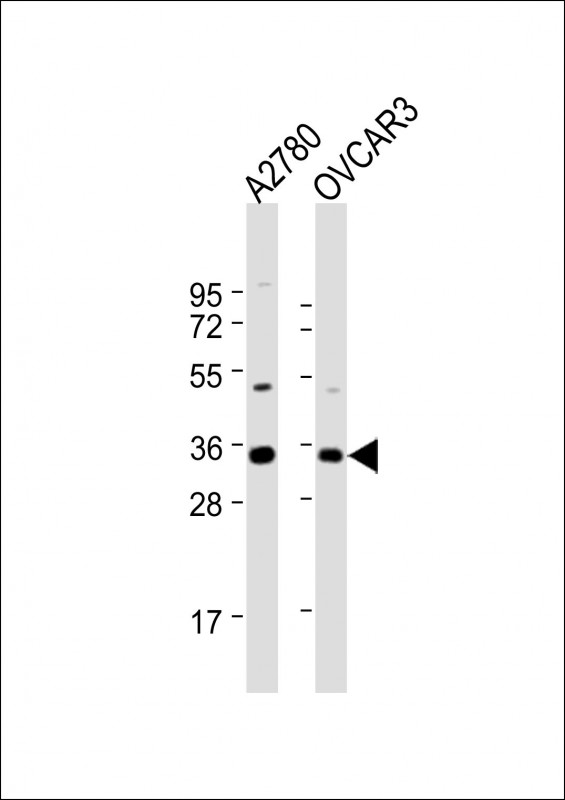
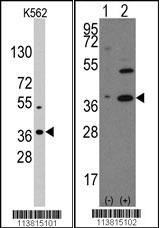
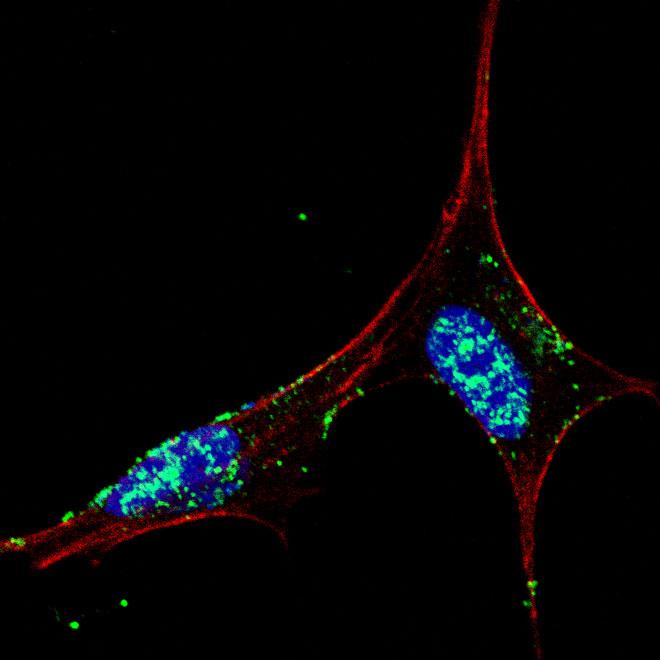
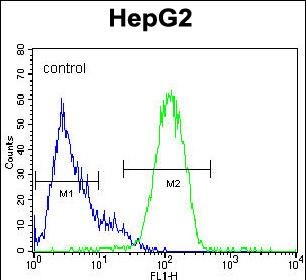
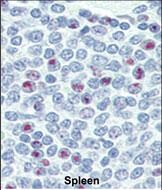
| WB | 1/1000 | Human,Mouse,Rat |
| IF | 咨询技术 | Human,Mouse,Rat |
| IHC | 1/100-1/500 | Human,Mouse,Rat |
| ICC | 1/10-1/50 | Human,Mouse,Rat |
| FCM | 1/10-1/50 | Human,Mouse,Rat |
| Elisa | 咨询技术 | Human,Mouse,Rat |
| Aliases | Homeobox protein NANOG, Homeobox transcription factor Nanog, hNanog, NANOG |
| Entrez GeneID | 79923 |
| WB Predicted band size | 34.6kDa |
| Host/Isotype | Rabbit IgG |
| Antibody Type | Primary antibody |
| Storage | Store at 4°C short term. Aliquot and store at -20°C long term. Avoid freeze/thaw cycles. |
| Species Reactivity | Human |
| Immunogen | This NANOG antibody is generated from rabbits immunized with a KLH conjugated synthetic peptide between 15-49 amino acids from the N-terminal region of human NANOG. |
| Formulation | Purified antibody in PBS with 0.05% sodium azide,1%BSA and 50% glycerol.prepared by Saturated Ammonium Sulfate (SAS) . |
+ +
以下是关于NANOG (N-term)抗体的3篇参考文献,简要总结如下:
---
1. **"The homeoprotein Nanog is required for maintenance of pluripotency in mouse epiblast and ES cells"**
- **作者**: Mitsui, K., Tokuzawa, Y., Itoh, H., Segawa, K., Murakami, M., et al.
- **摘要**: 本研究首次克隆了小鼠NANOG基因并开发了针对其N端表位的多克隆抗体,通过免疫印迹和免疫荧光验证了其在胚胎干细胞中的特异性表达,证实NANOG对维持多能性至关重要。
2. **"Downregulation of NANOG induces differentiation of human embryonic stem cells"**
- **作者**: Hyslop, L., Stojkovic, M., Armstrong, L., et al.
- **摘要**: 使用N端特异性抗体(如兔抗人NANOG N-term抗体)进行免疫荧光和Western blot,证明NANOG下调会导致人胚胎干细胞自发分化,强调了其在多能性维持中的核心作用。
3. **"Characterization of monoclonal antibodies specific for NANOG protein epitopes"**
- **作者**: Torres, J., Watt, F.M., et al.
- **摘要**: 研究系统比较了针对NANOG不同表位(包括N端、C端)的单克隆抗体,发现N-term抗体在染色质免疫沉淀(ChIP)和免疫组化中表现更优,提示其适用于功能研究。
---
**备注**:部分文献可能未明确区分N-term或C-term抗体,建议通过抗体供应商(如CST、Abcam)的产品说明书或引用文献进一步确认表位信息。
The NANOG (N-term) antibody is a specialized tool used to detect the N-terminal region of the NANOG protein, a key transcription factor critical for maintaining pluripotency in embryonic stem cells (ESCs) and induced pluripotent stem cells (iPSCs). NANOG, named after the Celtic myth "Tír na nÓg" ("Land of the Young"), plays a central role in self-renewal by suppressing differentiation signals and sustaining the undifferentiated state of stem cells. It functions in a regulatory network with OCT4 and SOX2. forming a core circuitry essential for pluripotency.
The antibody is commonly employed in techniques like Western blotting, immunofluorescence, and immunoprecipitation to study NANOG expression and localization. Its specificity for the N-terminal domain ensures recognition of full-length, functional NANOG, distinguishing it from potential truncated isoforms or degradation products. Researchers use it to explore NANOG's roles in early embryonic development, cellular reprogramming, and cancer biology, where aberrant NANOG expression is linked to tumorigenesis and metastasis.
Validated in various applications and species (e.g., human, mouse), the NANOG (N-term) antibody is crucial for advancing stem cell research, regenerative medicine, and oncological studies. Its reliability depends on proper controls, such as knockout cell lines, to confirm target specificity.
×